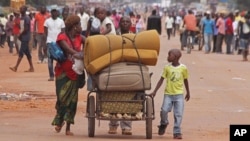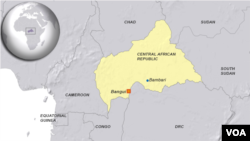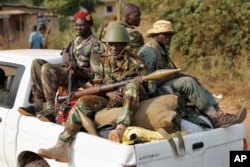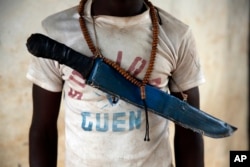Minutes after the passenger-laden convoy of trucks pulled out of Bangui's PK12 neighborhood in April 2014, mobs stormed past the cordon of soldiers that had held them back.
With their rightful owners gone, everything in the neighborhood was up for grabs.
Looters absconded with doors and roofs. They pillaged the mosque, shattering its windows and taking its furniture. And some simply moved in, taking over houses where Muslims once lived.
U.N. Secretary-General Ban Ki-moon has called the conflict in the Central African Republic “ethno-religious cleansing.”
The fate of the Muslim community and its property in PK12 is illustrative of how that plays out, and why it may take years to close the deep rift that has opened between the country’s Christians and Muslims.
“This is our land. We can’t just leave it to people,” said Ibrahim Tata, a Muslim who fled a neighborhood near PK12. He hopes to one day return and reclaim land he says is his.
PK12 is now a quiet neighborhood on Bangui’s northern frontier, but like most in the city it’s devoid entirely of Muslims.
That’s fine by Gervai Tekamba. He moved into a house vacated by a Muslim as the C.A.R.’s sectarian conflict unfolded. He hopes the former tenant never comes back.
“The house where I live in right now, it’s not for the Muslims, it’s for the Christians who are citizens of the Central African Republic,” said Tekamba, a nurse. “If the Muslims were to come back, I couldn’t accept that.”
Co-existence a memory
It was only a few years ago that Christians lived side-by-side with the country’s Muslim minority. But the trust between the two communities eroded in early 2013, when the mostly Muslim Seleka rebel coalition ousted President Francois Bozize.
The group’s fighters were less interested in governing than pillaging, and were accused of massive human rights abuses during their brief reign over the country.
By the end of 2013, militias known as the anti-Balaka had risen up against them, particularly in the country’s western half. But they went after not just the Seleka rebels, but the country’s entire Muslim community, whom they accused of supporting the Seleka and its excesses.
By April 2014, only two neighborhoods in Bangui were safe for Muslims. One of them was PK12.
Conditions there were untenable: people slept along a roadway, vulnerable to the grenades anti-Balaka would hurl at them. Muslim militiamen would also use the neighborhood to stage raids, leading to more bloodshed.
The aid community organized trucks to take about 1,300 Muslims to towns near the country’s northern border with Chad.
But many of the neighborhood’s former residents had decided on a less-lengthy journey: to PK5, another Bangui neighborhood where Muslims can live in relative safety. Today, it is the last neighborhood of its sort in the capital.
Those who took refuge there haven’t forgotten about their old property in PK12.
“If peace comes back, we will go and show the legal paper to show that this is our land,” said Mahamat Sirabjo, a student who grew up in PK12 but now lives in PK5.
Reconciliation remains elusive in the C.A.R. Pope Francis paid Bangui a visit last month amid tight security, but a Muslim who wandered out of PK5 the day after he departed was killed.
Land disputes are dangerous because they could upend whatever fragile peace CAR manages to build in the future, particularly if Muslims try to return to communities they were ousted from, said Jonathan Pedneault, a consulting researcher with Amnesty International.
“You’ve got thousands of Muslims throughout the country, not just in Bangui, who have had to flee their houses, flee their land to seek refuge,” Pedneault said. “If you are not able to put in place the necessary mechanisms to settle down claims before the returns start taking place, then you’ll end up with land disputes which can very easily be turned into confrontations between communities.”
With the pope’s high-profile visit over, many in the C.A.R. see the presidential elections scheduled for December 27 as the next opportunity for the country to end its years of crisis.








